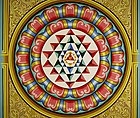Hinduism and Christianity
| Hinduism and other religions |
|---|
 |
| Indian religions |
| Abrahamic religions |
|
| Hinduism and... |
| Part of a series on |
| Christianity |
|---|
 |
This article possibly contains original research. (March 2025) |
There are also significant similarities between Christian and Hindu theology, most notably, both religions present a trinitarian view of God. The Holy Trinity in Christianity, which consists of the Father, the Son, and the Holy Spirit, is sometimes seen as being roughly analogous to the Trimurti in Hinduism, whose members—Brahma, Vishnu, and Shiva—are seen as the three principal manifestations of Brahman, or Godhead. Brahma, Vishnu, and Shiva are recognized as distinct deities as opposed to a singular being.
Christian-Hindu relations are a mixed affair. On one hand, Hinduism's natural tendency has been to recognize the divine basis of various other religions, and to revere their founders and saintly practitioners. In Western countries,
The
History
This section relies largely or entirely upon a single source. (March 2025) ) |
There has been some debate on historical connections between Christianity and Indian religion, which has focused on both
Although little is known of the immediate growth of the church,
Contemporary Christian-Hindu relations are a mixed affair. Hinduism's historical tendency has been to recognize the divine basis of various other religions, and to revere their founders and saintly practitioners; this continues today. The declaration Nostra aetate by the Second Vatican Council officially established inter-religious dialogue between Catholics and Hindus, promoting common values between the two religions (among others). There are over 17.3 million Catholics in India, which represents less than 2% of the total population, still making it the largest Christian church in India. (See also: Dalit theology).
Doctrine
This section needs additional citations for verification. (March 2025) |
Hinduism and Christianity differ on fundamental beliefs on heaven, hell and reincarnation, to name a few. From the Hindu perspective, heaven (Sanskrit: swarga) and hell (naraka) are temporary places, where every soul has to live, either for the good deeds done or for their sins committed. After a soul suffers its due punishment in hell, or after a soul has enjoyed enough in heaven, it again enters the life-death cycle. There is no concept in Hinduism of a permanent hell like that in Christianity; rather, the cycle of "karma" takes over. Permanent heaven or bliss is "moksha".
Indian philosopher Sarvepalli Radhakrishnan, wrote:
Unfortunately Christian religion inherited the Semitic creed of the ‘jealous God’ in the view of Christ as ‘the only begotten son of God’ so could not brook any rival near the throne. When Europe accepted the Christian religion, in spite of its own broad humanism, it accepted the fierce intolerance which is the natural result of belief in 'the truth once for all delivered to the saints.'[8]
The Holy Trinity of Christianity, consisting of the Father, Son, and Holy Spirit, is sometimes seen as roughly analogous to the Trimurti of Hinduism, whose members—Brahma, Vishnu, and Shiva—are seen as the three principal manifestations of Brahman, or Godhead. The specific formulation of this trinitarian relationship is not identical between the two religions; for example, in Hinduism there is a Parabrahma, or an ultimate creator who created the Trimurti, for which there exists no parallel in Christianity. Some consider Brahma to be more similar to the demiurge of Christian gnosticism, in that he (at least initially) wrongly thought himself as the "Creator" and also as the highest or even the only god. In this case, the Hindu version of the Trinity could be seen as Brahma (Father), Sankarshan or Vishnu (Holy spirit), and Mahesh or Shiva (Son; analogous to Christ).
There have been Christian writers such as the 17th century mystic
In Hinduism (also in
The
See also
- Christianity and other religions
- Christianity in India
- Goa Inquisition
- Gullipilli Sowria Raj v. Bandaru Pavani
- Hinduism and other religions
- Journal of Hindu-Christian Studies
- Religious violence in Odisha
- Saint Thomas Christians
- Violence against Christians in India
References
- Christian Ashram Movement
- ^ Natesan, G.A. (1948). The Indian Review. G. A. Natesan & Company. Retrieved 2023-03-01.
- ISBN 978-93-80607-21-4. Retrieved 2023-03-01.
- ISBN 978-1-000-16997-3. Retrieved 2023-03-01.
- ^ Indian Institute of World Culture (1993). Transaction - Indian Institute of World Culture. Retrieved 2023-03-01.
- ^ The Court Journal: Court Circular & Fashionable Gazette. Alabaster, Pasemore & sons, Limited. 1833. p. 723. Retrieved 2023-03-01.
- ^ A. E. Medlycott, India and The Apostle Thomas, pp.18–71; M. R. James, Apocryphal New Testament, pp.364–436; A. E. Medlycott, India and The Apostle Thomas, pp.1–17, 213–97; Eusebius, History, chapter 4:30; J. N. Farquhar, The Apostle Thomas in North India, chapter 4:30; V. A. Smith, Early History of India, p.235; L. W. Brown, The Indian Christians of St. Thomas, p.49-59.
- ^ The Philosophy of Sarvepalli Radhakrishnan, by Paul Arthur Schilpp, page = 641
- better source needed]
